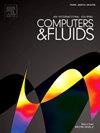Optimized workload distribution for GPU-accelerated combustion simulations in heterogeneous CPU–GPU architectures
IF 3
3区 工程技术
Q3 COMPUTER SCIENCE, INTERDISCIPLINARY APPLICATIONS
引用次数: 0
Abstract
This work presents a set of workload distribution algorithms designed to optimize the hybrid use of CPUs and GPUs in reacting flow simulations on heterogeneous High-Performance Computing (HPC) systems. The algorithms extend advanced computational software originally developed for CPUs to hybrid CPU–GPU environments. Unlike GPU-exclusive software, hybrid codes require specialized orchestration to maximize GPU utilization while minimizing CPU idle time. Combustion simulations are computationally demanding due to the evaluation of non-linear source terms and the transport of large number of PDEs with strong imbalanced MPI workloads, so it requires highly efficient codes with advanced parallel algorithms. Algorithms based on different MPI-GPU mapping roles defined to maximize chemistry batch size while reducing GPU communication overhead are proposed to accelerate combustion simulations using heterogeneous HPC systems. These approaches offload the expensive chemical integration step to the GPUs, while the transport remains on the CPUs using an operator splitting technique. Stiff chemical integration is GPU-accelerated with ChemInt, a newly developed CPU/GPU-compatible C++/CUDA library designed for coupling with CPU-based CFD codes. A comparison of the different approaches is presented and discussed demonstrating performance improvements of more than threefold over CPU-only executions.
异构CPU-GPU架构中gpu加速燃烧模拟的优化工作负载分配
这项工作提出了一套工作负载分配算法,旨在优化cpu和gpu在异构高性能计算(HPC)系统反应流模拟中的混合使用。这些算法将最初为cpu开发的高级计算软件扩展到CPU-GPU混合环境。与GPU专用软件不同,混合代码需要专门的编排来最大化GPU利用率,同时最小化CPU空闲时间。由于燃烧模拟需要对非线性源项进行评估,并且需要传输大量具有强不平衡MPI负载的pde,因此需要具有先进并行算法的高效代码。提出了基于不同MPI-GPU映射角色的算法,以最大化化学批处理规模,同时减少GPU通信开销,从而加速异构HPC系统的燃烧模拟。这些方法将昂贵的化学集成步骤卸载到gpu上,而使用算子拆分技术将传输留在cpu上。ChemInt是一种新开发的CPU/ gpu兼容c++ /CUDA库,旨在与基于CPU的CFD代码耦合。本文给出并讨论了不同方法的比较,证明了与仅使用cpu执行相比,性能提高了三倍以上。
本文章由计算机程序翻译,如有差异,请以英文原文为准。
求助全文
约1分钟内获得全文
求助全文
来源期刊

Computers & Fluids
物理-计算机:跨学科应用
CiteScore
5.30
自引率
7.10%
发文量
242
审稿时长
10.8 months
期刊介绍:
Computers & Fluids is multidisciplinary. The term ''fluid'' is interpreted in the broadest sense. Hydro- and aerodynamics, high-speed and physical gas dynamics, turbulence and flow stability, multiphase flow, rheology, tribology and fluid-structure interaction are all of interest, provided that computer technique plays a significant role in the associated studies or design methodology.
 求助内容:
求助内容: 应助结果提醒方式:
应助结果提醒方式:


